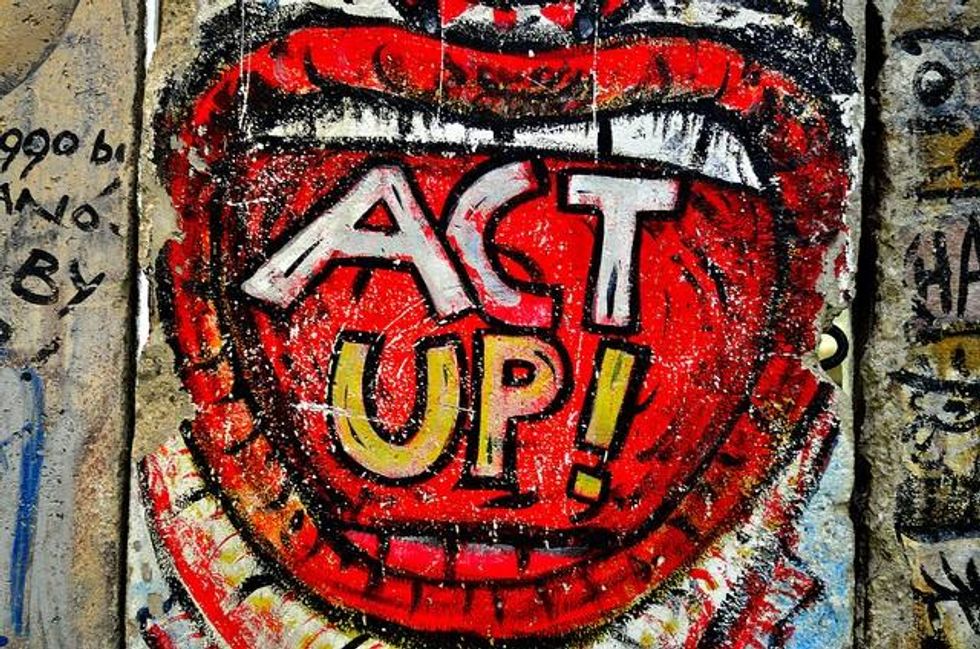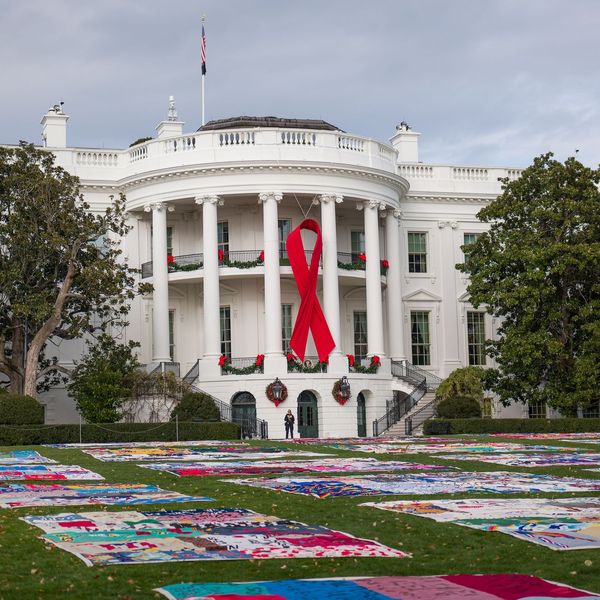World AIDS Day: The Journey Ahead
The AIDS crisis was the first true epidemic of the era of globalization. Its rapid and devastating spread blasted through borders and stoked worldwide panic, in part because it seemed relatively democratic in its choice of victims, rich and poor alike. As the crisis "went viral" in a pre-Internet age, it both reflected and pushed the trend toward transnational social experience: as the casualties climbed with no cure in sight, HIV/AIDS challenged national boundaries and forced the public health community to seek solutions that could match the epidemic's borderless vector.
The AIDS crisis was the first true epidemic of the era of globalization. Its rapid and devastating spread blasted through borders and stoked worldwide panic, in part because it seemed relatively democratic in its choice of victims, rich and poor alike. As the crisis "went viral" in a pre-Internet age, it both reflected and pushed the trend toward transnational social experience: as the casualties climbed with no cure in sight, HIV/AIDS challenged national boundaries and forced the public health community to seek solutions that could match the epidemic's borderless vector.
And as we enter the second post-AIDS generation, we can take stock of how far activists, health workers, and survivors have journeyed and how far we have to go. There have been major advancements in treatment methods, and access for "developing" countries has improved. But there are still massive treatment gaps between Global North and South, and between rich and poor. In the United States, while infection rates have dropped, HIV continues to afflict poor communities of color, and the stigma and social tensions surrounding people living with HIV/AIDS still stand as a barrier to social services, employment, and equal treatment in the healthcare system. Stigma and other forms of discrimination hit especially hard in the LGBTQ community and for marginalized groups like sex workers and people involved with the criminal justice system. And for many immigrants around the world, HIV doesn't just lead to social barriers, it is the barrier.

Although HIV often coincides with other social hardships that can impede one's right to free movement across borders, the removal of the ban marked a step toward full recognition of the human rights of people living with HIV/AIDS. But there are places around the world where HIV remains a bar to entry and access. Some governments have even sought to deport people with HIV/AIDS - a disturbing convergence of draconian immigration enforcement policies, institutionalized discrimination, and social ignorance with profound public health effects.
According to a 2009 report by UNAIDS:
As shocking as the fact that such restrictions continue to exist are the harmful and various impacts that they have on people who endure them - mandatory testing without counselling or health care; denial of the opportunity to work or study abroad; deportation without notice leading to economic devastation; imprisonment; separation from family and loved ones; special "entry waivers" and application procedures; notification of HIV status in immigration documents. Such measures are discriminatory and represent a violation of international human rights standards. They can deprive people of their dignity and health, and there is no evidence that they protect the public health.
And for migrants caught in a legal limbo between borders, such as refugees fleeing conflict, HIV/AIDS forces them into potentially lethal isolation - perhaps deprived of medicine, or pushed into coercive testing or degrading treatment by healthcare institutions. Whether they face physical or social exile, the people impacted by this global pandemic struggle against both subsurface prejudices and hardened borders.

Such restrictions are a symptom of the underlying inequalities reinforced by border policies. Until all are able to reach across those bounds - to connect with loved ones, to access the resources they need to support their health and livelihoods, and to share their insights into global social problems without fear - we're all at risk of the plague of closed minds.
An Urgent Message From Our Co-Founder
Dear Common Dreams reader, The U.S. is on a fast track to authoritarianism like nothing I've ever seen. Meanwhile, corporate news outlets are utterly capitulating to Trump, twisting their coverage to avoid drawing his ire while lining up to stuff cash in his pockets. That's why I believe that Common Dreams is doing the best and most consequential reporting that we've ever done. Our small but mighty team is a progressive reporting powerhouse, covering the news every day that the corporate media never will. Our mission has always been simple: To inform. To inspire. And to ignite change for the common good. Now here's the key piece that I want all our readers to understand: None of this would be possible without your financial support. That's not just some fundraising cliche. It's the absolute and literal truth. We don't accept corporate advertising and never will. We don't have a paywall because we don't think people should be blocked from critical news based on their ability to pay. Everything we do is funded by the donations of readers like you. Will you donate now to help power the nonprofit, independent reporting of Common Dreams? Thank you for being a vital member of our community. Together, we can keep independent journalism alive when it’s needed most. - Craig Brown, Co-founder |
The AIDS crisis was the first true epidemic of the era of globalization. Its rapid and devastating spread blasted through borders and stoked worldwide panic, in part because it seemed relatively democratic in its choice of victims, rich and poor alike. As the crisis "went viral" in a pre-Internet age, it both reflected and pushed the trend toward transnational social experience: as the casualties climbed with no cure in sight, HIV/AIDS challenged national boundaries and forced the public health community to seek solutions that could match the epidemic's borderless vector.
And as we enter the second post-AIDS generation, we can take stock of how far activists, health workers, and survivors have journeyed and how far we have to go. There have been major advancements in treatment methods, and access for "developing" countries has improved. But there are still massive treatment gaps between Global North and South, and between rich and poor. In the United States, while infection rates have dropped, HIV continues to afflict poor communities of color, and the stigma and social tensions surrounding people living with HIV/AIDS still stand as a barrier to social services, employment, and equal treatment in the healthcare system. Stigma and other forms of discrimination hit especially hard in the LGBTQ community and for marginalized groups like sex workers and people involved with the criminal justice system. And for many immigrants around the world, HIV doesn't just lead to social barriers, it is the barrier.

Although HIV often coincides with other social hardships that can impede one's right to free movement across borders, the removal of the ban marked a step toward full recognition of the human rights of people living with HIV/AIDS. But there are places around the world where HIV remains a bar to entry and access. Some governments have even sought to deport people with HIV/AIDS - a disturbing convergence of draconian immigration enforcement policies, institutionalized discrimination, and social ignorance with profound public health effects.
According to a 2009 report by UNAIDS:
As shocking as the fact that such restrictions continue to exist are the harmful and various impacts that they have on people who endure them - mandatory testing without counselling or health care; denial of the opportunity to work or study abroad; deportation without notice leading to economic devastation; imprisonment; separation from family and loved ones; special "entry waivers" and application procedures; notification of HIV status in immigration documents. Such measures are discriminatory and represent a violation of international human rights standards. They can deprive people of their dignity and health, and there is no evidence that they protect the public health.
And for migrants caught in a legal limbo between borders, such as refugees fleeing conflict, HIV/AIDS forces them into potentially lethal isolation - perhaps deprived of medicine, or pushed into coercive testing or degrading treatment by healthcare institutions. Whether they face physical or social exile, the people impacted by this global pandemic struggle against both subsurface prejudices and hardened borders.

Such restrictions are a symptom of the underlying inequalities reinforced by border policies. Until all are able to reach across those bounds - to connect with loved ones, to access the resources they need to support their health and livelihoods, and to share their insights into global social problems without fear - we're all at risk of the plague of closed minds.
The AIDS crisis was the first true epidemic of the era of globalization. Its rapid and devastating spread blasted through borders and stoked worldwide panic, in part because it seemed relatively democratic in its choice of victims, rich and poor alike. As the crisis "went viral" in a pre-Internet age, it both reflected and pushed the trend toward transnational social experience: as the casualties climbed with no cure in sight, HIV/AIDS challenged national boundaries and forced the public health community to seek solutions that could match the epidemic's borderless vector.
And as we enter the second post-AIDS generation, we can take stock of how far activists, health workers, and survivors have journeyed and how far we have to go. There have been major advancements in treatment methods, and access for "developing" countries has improved. But there are still massive treatment gaps between Global North and South, and between rich and poor. In the United States, while infection rates have dropped, HIV continues to afflict poor communities of color, and the stigma and social tensions surrounding people living with HIV/AIDS still stand as a barrier to social services, employment, and equal treatment in the healthcare system. Stigma and other forms of discrimination hit especially hard in the LGBTQ community and for marginalized groups like sex workers and people involved with the criminal justice system. And for many immigrants around the world, HIV doesn't just lead to social barriers, it is the barrier.

Although HIV often coincides with other social hardships that can impede one's right to free movement across borders, the removal of the ban marked a step toward full recognition of the human rights of people living with HIV/AIDS. But there are places around the world where HIV remains a bar to entry and access. Some governments have even sought to deport people with HIV/AIDS - a disturbing convergence of draconian immigration enforcement policies, institutionalized discrimination, and social ignorance with profound public health effects.
According to a 2009 report by UNAIDS:
As shocking as the fact that such restrictions continue to exist are the harmful and various impacts that they have on people who endure them - mandatory testing without counselling or health care; denial of the opportunity to work or study abroad; deportation without notice leading to economic devastation; imprisonment; separation from family and loved ones; special "entry waivers" and application procedures; notification of HIV status in immigration documents. Such measures are discriminatory and represent a violation of international human rights standards. They can deprive people of their dignity and health, and there is no evidence that they protect the public health.
And for migrants caught in a legal limbo between borders, such as refugees fleeing conflict, HIV/AIDS forces them into potentially lethal isolation - perhaps deprived of medicine, or pushed into coercive testing or degrading treatment by healthcare institutions. Whether they face physical or social exile, the people impacted by this global pandemic struggle against both subsurface prejudices and hardened borders.

Such restrictions are a symptom of the underlying inequalities reinforced by border policies. Until all are able to reach across those bounds - to connect with loved ones, to access the resources they need to support their health and livelihoods, and to share their insights into global social problems without fear - we're all at risk of the plague of closed minds.

